They are: Marcel Chotkowski LaFollette’s Writing for Their Lives: America’s Pioneering Female Science Journalists (MIT Press, 2023); Santi Elijah Holley’s An Amerikan Family: The Shakurs and the Nation They Created (Mariner, 2024); Jane Ferguson’s No Ordinary Assignment: A Memoir (Mariner, 2023); Alan Philps’, The Red Hotel: Moscow 1941, the Metropol Hotel, and the Untold Story of Stalin’s Propaganda War (Pegasus Books, 2023); and Ari Shapiro’s The Best Strangers in the World: Stories from a Life Spent Listening (HarperOne, 2024).
Honoring a Storied Biographer
The Sperber Prize is given in honor of the late Ann M. Sperber, the author of Murrow: His Life and Times, the critically acclaimed biography of journalist Edward R. Murrow. One edition of that work was published by Fordham University Press, connecting the Sperber family to the university.
Through the generous support of Ann’s mother, Lisette, the $1,000 award was established to promote and encourage biographies and memoirs that focus on a media professional. It has been presented annually by Fordham University’s Department of Communication and Media Studies since 1999.
Professor of Communication and Media Studies Amy Aronson, Ph.D., director of the Sperber Prize, said the five finalists emerged from a pool of 48 titles considered for this year’s award. The winner will receive a $1,000 prize and be invited to keynote a public award ceremony held at Fordham’s Manhattan campus on November 11. The 6 p.m. event is free and open to the public.
“Our finalists take readers to profound encounters in less-traveled corners of the U.S. and the world,” Aronson said.
“They take us behind the front lines in dangerous conflict zones, reveal hidden stories of journalistic risk-taking, and into carefully researched biographies of public visionaries. All show us the vital importance of journalists and media voices in the world today.”
Previous winners of the Sperber Prize include Working by Robert Caro, Fire Shut Up in My Bones by Charles M. Blow, Cronkite by Douglas Brinkley, Lives of Margaret Fuller by John Matteson, Reporter by Seymour M. Hersh, The Publisher: Henry Luce and His American Century by Alan Brinkley, Avid Reader: A Life by Robert Gottlieb, and All Governments Lie! The Life and Times of Rebel Journalist I.F. Stone by Myra MacPherson. The most recent winner was The Newspaper Axis: Six Press Barons Who Enabled Hitler by Kathryn Olmsted.
The Finalists
LaFollette’s Writing for Their Lives profiles the first generation of women reporters who worked for Science Service, the first news organization in the country dedicated entirely to scientific journalism. LaFollette, author of Science on American Television, reveals that when the Service began in 1921, very few journalism organizations covered science at all, and those that did treated the subject cavalierly, putting any science hobbyist already on staff onto the rare stories deemed important enough to cover. They were all male hobbyists, of course. LaFollette explores how an aspiring and ambitious group of women writers confronted pervasive sexism and gender discrimination to create meaningful careers for themselves while developing a new and increasingly crucial journalistic beat.
Tupac Shakur, the late rapper who was killed in 1996 at the age of 25, was the “spark” for Holley’s An Amerikan Family, which explores the story of the Shakur family and their work for Black liberation in America. Some may be familiar with the rapper’s mother, Assata Shakur, the activist and writer for the Black Panther Party newsletter, living for three decades in Cuban exile, and many have come to know at least something about the iconic Tupac, her son. But Holley, a writer published in the Atlantic, New Republic, Economist, Guardian, and Washington Post, reveals that the branches of the Shakur family tree spread widely and ran deep into the underground of the civil rights struggle. The book is both a family genealogy and a larger story of one community’s struggle for racial justice, taking extreme, unconventional, and often perilous measures in that quest.
Ferguson’s No Ordinary Assignment is the memoir of a journalist who has covered nearly every war and humanitarian crisis of our time. A correspondent for PBS NewsHour, Ferguson was in Yemen for the Arab Spring. She managed to report from rebel-held Syria during its civil war despite the ban on foreign journalists. She was one of the last reporters to remain in Afghanistan when the Taliban claimed Kabul in 2021. Born and raised a Protestant in Northern Ireland during the Troubles, Ferguson is no stranger to sectarian violence or grave suffering. Her debut book chronicles the story of a remarkable woman coming into her own in the world’s most perilous and devastating circumstances as she dares to tell the hardest stories on earth as an act of justice.
Philps’ The Red Hotel takes readers inside the experiences of a cadre of American, British, and Australian journalists who reported from Moscow when Hitler invaded Russia in the summer of 1941. They were allowed to stay and report on the war at the Eastern front – as long as their stories were flattering to the Stalin regime. To help ensure this impossibly good press, they were billeted at the luxurious Metropol Hotel and supplied with bottomless vessels of vodka, lavish banquets, and young Russian secretaries and translators who were spies and sometimes prostitutes. Philps, who served as Moscow correspondent for Reuters and foreign editor of the Telegraph, reveals that while many of the translators conveyed Kremlin disinformation, some were dissidents who whispered to reporters about the truth of Soviet life and Stalin’s lies.
Shapiro’s The Best Strangers in the World takes readers around the globe to reveal the stories behind the sometimes heartwarming, sometimes heartbreaking narratives he reports to his listeners. The co-host of NPR’s All Things Considered, this book, his first, takes readers from Turkey to Ukraine to Indonesia to Northern Iraq; from drag shows in Florida to the corridors of power in Washington, DC; from war-torn locales in the Middle East and Africa as he follows the paths of refugees fleeing conflict to big cities and small towns. The result is a memoir-in-essays that is a love letter to journalism and a look at scores of individuals who not only refuse to break but also manage to confront life’s ugliness with beauty, meet horror with humor, and smile in the face of whatever might come next.
For additional information, questions, or press inquiries, please contact Amy Aronson at [email protected].
]]>The Sperber Prize is given in honor of the late Ann M. Sperber, the author of Murrow: His Life and Times, the critically acclaimed biography of journalist Edward R. Murrow. One edition of that work was published by Fordham University Press, connecting the Sperber family to the University. Through the generous support of Ann’s mother, Lisette, the $1,000 award was established to promote and encourage biographies and memoirs that focus on a professional in journalism. The award has been presented annually by Fordham’s Department of Communication and Media Studies since 1999.
Associate Professor of Communication and Media Studies Beth Knobel, Ph.D., director of the Sperber Prize, said that nearly 60 books with 2021 copyrights were considered for the award.
“This year, there were so many wonderful biographies and memoirs that we found it difficult to pick the finalists,” said Knobel. “The seven members of the jury found a great many of the books nominated to be well-written, well-researched, and absolutely fascinating.”
Here are the six finalists:
- Elizabeth Becker’s You Don’t Belong Here: How Three Women Rewrote the Story of War, published by Public Affairs. This work tells the long-buried story of three extraordinary female journalists who permanently shattered the barriers to women covering war. Becker, an award-winning author and journalist, has covered national and international affairs as a Washington correspondent at The New York Times, a senior foreign editor at National Public Radio, and a correspondent at The Washington Post.
- Marvin Kalb’s Assignment Russia: Becoming a Foreign Correspondent in the Crucible of the Cold War, published by Brookings. This book, Kalb’s second memoir of his years living in the Soviet Union, presents a personal journey through some of the darkest moments of the Cold War and the early days of television news. Kalb’s distinguished journalism career spans more than 30 years and includes award-winning reporting for both CBS and NBC News as chief diplomatic correspondent, Moscow bureau chief, and anchor of NBC’s Meet the Press. He is professor emeritus at Harvard University and hosts The Kalb Report at the National Press Club.
- Melanie Kirkpatrick’s Lady Editor: Sarah Josepha Hale and the Making of the Modern American Woman, published by Encounter Books. For half a century, Sarah Josepha Hale was the most influential woman in America. As editor of Godey’s Lady’s Book, Hale was the leading cultural arbiter for the growing nation, a powerful advocate for educational and professional opportunities for women, and the godmother of our national Thanksgiving Day. Melanie Kirkpatrick is a senior fellow at the Hudson Institute. She spent 30 years at The Wall Street Journal, where she began as a copy editor on the overnight desk in Hong Kong and rose to become op-ed editor, editorial writer, and deputy editor of The Wall Street Journal editorial page.
- Judith Mackrell’s The Correspondents: Six Women Writers on the Front Lines of World War II, published by Doubleday. The Correspondents presents the untold history of a group of heroic women reporters who revolutionized the narrative of World War II—from Martha Gellhorn, who out-scooped her husband, Ernest Hemingway, to Lee Miller, a Vogue cover model turned war correspondent. Mackrell is the critically acclaimed author of The Unfinished Palazzo and Flappers. She is also a celebrated dance critic, and her biography of the ballerina Lydia Lopokova, Bloomsbury Ballerina, was short-listed for the Costa Biography Award.
- Lisa Napoli’s Susan, Linda, Nina and Cokie: The Extraordinary Story of the Founding Mothers of NPR, published by Abrams. This group biography profiles four beloved women who fought sexism, covered decades of American news, and whose voices defined National Public Radio. Napoli has had a long career in print, radio, TV, and online journalism. She has worked at The New York Times, Marketplace, MSNBC, and KCRW. She is the author of three previous books, Radio Shangri-La, Ray & Joan, and Up All Night: Ted Turner, CNN, and the Birth of 24-Hour News.
- Donald A. Ritchie’s The Columnist: Leaks, Lies, and Libel in Drew Pearson’s Washington, published by Oxford University Press. In the “Washington Merry-Go-Round,” a nationally syndicated newspaper column that appeared in hundreds of papers from 1932 to 1969, as well as on weekly radio and television programs, the investigative journalist Drew Pearson revealed news that public officials tried to suppress. The Columnist examines how Pearson managed to uncover secrets so successfully and why government efforts to find his sources proved so unsuccessful. Ritchie, the author or editor of more than one dozen books, is the Historian Emeritus of the U.S. Senate.
Previous winners of the Sperber Prize include Working by Robert Caro, Fire Shut Up in My Bones by Charles M. Blow, Cronkite by Douglas Brinkley, Lives of Margaret Fuller by John Matteson, Reporter by Seymour M. Hersh, The Publisher: Henry Luce and His American Century by Alan Brinkley, Avid Reader: A Life by Robert Gottlieb, and All Governments Lie! The Life and Times of Rebel Journalist I.F. Stone by Myra MacPherson. In 2021, the Sperber Prize was awarded to two biographies, Kerri K. Greenidge’s biography Black Radical: The Life and Times of William Monroe Trotter and Lesley M. M. Blume’s FALLOUT: The Hiroshima Cover-up and the Reporter Who Revealed It to the World about war correspondent John Hersey.
The winner of the 2022 Sperber Prize will be announced in September and awarded in November at a ceremony held at Fordham’s Lincoln Center campus.
More information about the award, its jury, and its history can be found at Sperberprize.com. If you have any questions, please contact Beth Knobel at [email protected] or 718-817-5041.
]]>Ironically, the award was given to Hersh for a book— Reporter: A Memoir (Knopf, 2018)—that he never planned to write.
An investigative journalist who’s penned 10 books about topics as varied as Henry Kissinger, John F. Kennedy Jr., and the Gulf War, Hersh said Reporter was actually the result of his failure to finish what would have been his 11th book. After decades cultivating sources deep within the American military and intelligence community, he signed a contract and got a big advance to write a book about former vice president Dick Cheney. Then his sources got cold feet.
“I began to share some of the stuff I was going to say, and they said, ‘We’re going to go to jail if you do that,’” Hersh said at the award ceremony, held at the Lincoln Center campus.
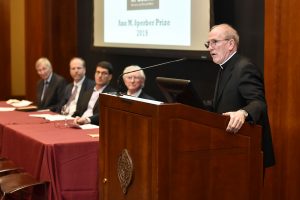
“I’d gotten a huge contract and I’d worked for years on their money, and said, ‘I’m dead.’ [The publisher] said, ‘Well, you can do one of two things. You can go to the gulag and start paying us a dollar a week, or do a memoir.’ So that’s why I did it. Not for mercenary reasons, but to save my life,” he said, laughing.
Joseph M. McShane, S.J., president of Fordham, lauded Hersh, whose work also includes a 2004 bombshell piece about U.S. military abuse at the Abu Ghraib prison in Baghdad, for being someone who educates the public through his life’s work. Father McShane called Reporter “a story of incredible strength, and incredible courage that is told with a very critical but loving eye.”
“There is one phrase that I think probably characterizes your life, and it is this: There is no hunger like the hunger of truth,” he said to Hersh.
“Once you have tasted it, it creates a longing, and you have spent your life really giving into that longing.”
Andrew Meier, chairman of the department of journalism at the New School, said at the ceremony that he read Reporter in one night and it left him mesmerized, stunned, and eternally grateful to Hersh for his work. He called it a landmark of our generation. When he reviewed the book last summer for Book Forum, he dubbed it a “miracle.”
“Hersh has done more than stand witness; he has done the hard digging, again and again and again, and even now, he’s still digging, five decades and counting of scoops,” he said.
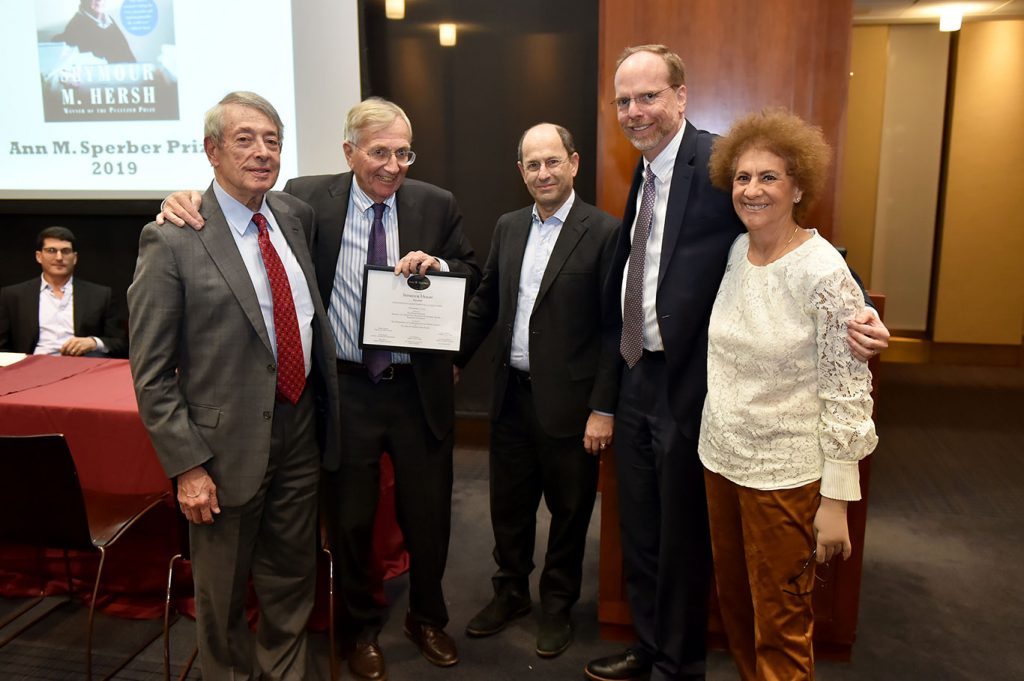
In his acceptance remarks, Hersh also reflected on the lessons he learned as a young reporter covering crime in Chicago. Some were harsh ones about the pervasiveness of racism, even within journalism, such as when he was instructed by an editor to “cheap up” a story about the death of a family when it was revealed they were black.
He also recalled a time when he was instructed to self-censor a story about police misconduct to protect a good relationship with authorities. And in a knock at the current obsession with breaking news first, he also said he learned you could be a better reporter even if you were the second one to write about something.
Perhaps most relevant to today’s current events, he said, is the value of the sources that he’s been able to cultivate over the years. As an example, he singled out Major General Antonio M. Taguba, who sacrificed his career in the military when he leaked a report on Abu Ghraib to Hersh.
“Over the years I’ve learned that the people to find are those people on the inside who believe in being there even now, in this government, who believe the best thing they can do is the best they can. Who are inside, in a sense, and are not afraid to talk about things that go wrong, and take a chance,” he said.
He also had advice for aspiring journalists in the audience.
“If you want to do better in life and reporting, as a journalist, do read before you write,” he said. “Have enough information so you can do a narrative. That means do a lot of work.”
The Sperber Prize was established in 1999 by Liselotte Sperber to honor the memory of her daughter Ann, who wrote the definitive biography of Edward R. Murrow, Murrow: His Life and Times (Freundlich, 1986).
Past winners have included New York Times columnist Charles M. Blow, for his memoir Fire Shut Up in My Bones (Houghton Mifflin Harcourt, 2014), and Robert Miraldi, who won in 2014 for his biography of Hersh, Seymour Hersh: Scoop Artist (University of Nebraska Press, 2013).
The prize is administered by Fordham’s Department of Communication and Media Studies.
]]>The award, which was presented in a ceremony at the Lincoln Center campus, was given to Stephens for his book The Voice of America: Lowell Thomas and the Invention of 20th-Century Journalism (St. Martin’s Press, 2017).
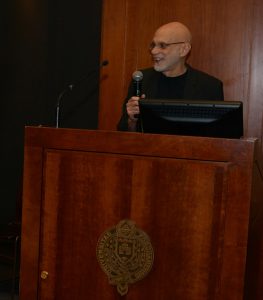
In accepting the prize, Stephens spoke fondly about his subject, particularly his zest for going literally anywhere in the world for a story.
“He had tremendous spirit, he was a nice man, he was kind to everyone he met, he was interested in everybody he met, and he had this amazing desire to travel, to go there, to put his feet on the ground. It was a real pleasure to follow in his footsteps,” he said.
Joseph M. McShane, S.J. president of Fordham, congratulated Stephens for writing what he called a “lovingly objective” biography of Thomas, who worked in radio from 1930 to 1976, hosted the first-ever television news broadcast in 1939, and traveled to the furthest corners of the globe to report news stories. He singled out Thomas’ granddaughter Anne Thomas Donaghy, who was in the audience, as an honor for Fordham.
“Thomas was an iconic figure whose life is now recorded in masterful prose, in a magisterial way, with affection for the subject,” Father McShane said.
Ron Simon, television curator for the Paley Center of Media, told the audience that although Thomas is not as well remembered today in journalism circles as figures such as Edward R. Murrow, he was the most famous journalist of his time.
While Thomas is perhaps known best for discovering and promoting T.E. Lawrence, AKA “Lawrence of Arabia,” Simon said Stephens made a convincing case that Thomas helped set the standard that contemporary journalists strive to uphold.
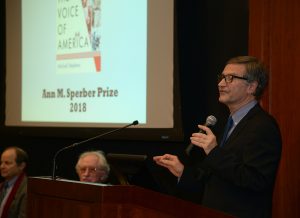
“Thomas began his career as a captivating lecturer, using slides and films, sometimes stretching the facts to fit the morals of his stories. But when he commenced his nightly news broadcast when he was 40 years old, he wanted to report the news right down the middle, and not to let anyone know his political persuasion,” he said.
“Mitch persuasively argues that this decision by Lowell to be impartial sets the standard for network news history about creativity and fairness.”
Rick Moulton, director and producer of the documentary The Voice of America: Lowell Thomas and the Rise of Broadcast Journalism, which Stephens appears in, noted at the ceremony that while he was reviewing thousands of visuals for the project, Stephens was tracking down endless written details about Lowell’s life.
“While the paper trail offered a verifiable record, Mitch understood the journalistic principle that if you want to understand the story, you have to walk the ground. So he did just that, literally following Lowell’s life around the world, from Greenville, Ohio, to the gold camps of Colorado, the west side of Chicago, up to Alaska, on to London, the Middle East, India, Nepal, Tibet, and finally Australia,” he said.
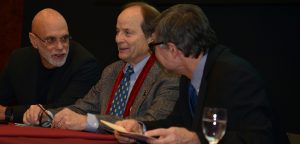
“Like the messenger Lowell Thomas, he was traveling on truth’s account, compiling the story of this man, who became, as we sensed, the ‘Voice of America.’”
Stephens, whose children and grandchildren were present for the ceremony, and whose previous work has delved into the history of journalism, said that Lowell had always floated at the edge of his consciousness. But he only considered writing a biography when Moulton, who was with Lowell the day he died in 1981, asked him to be part of his documentary. He said the Sperber award held special significance for him.
“I met Ann Sperber once at NYU when she was visiting to give a talk on Murrow. I’m a great fan of Murrow and her biography of him, so it’s a real honor to accept a prize with her name on it.”
The Sperber Prize was established by Liselette Sperber to honor the memory of her daughter Ann, who wrote the definitive biography of Edward R. Murrow, Murrow: His Life and Times (Freundlich, 1986). It is administered by Fordham’s Department of Communication and Media Studies.
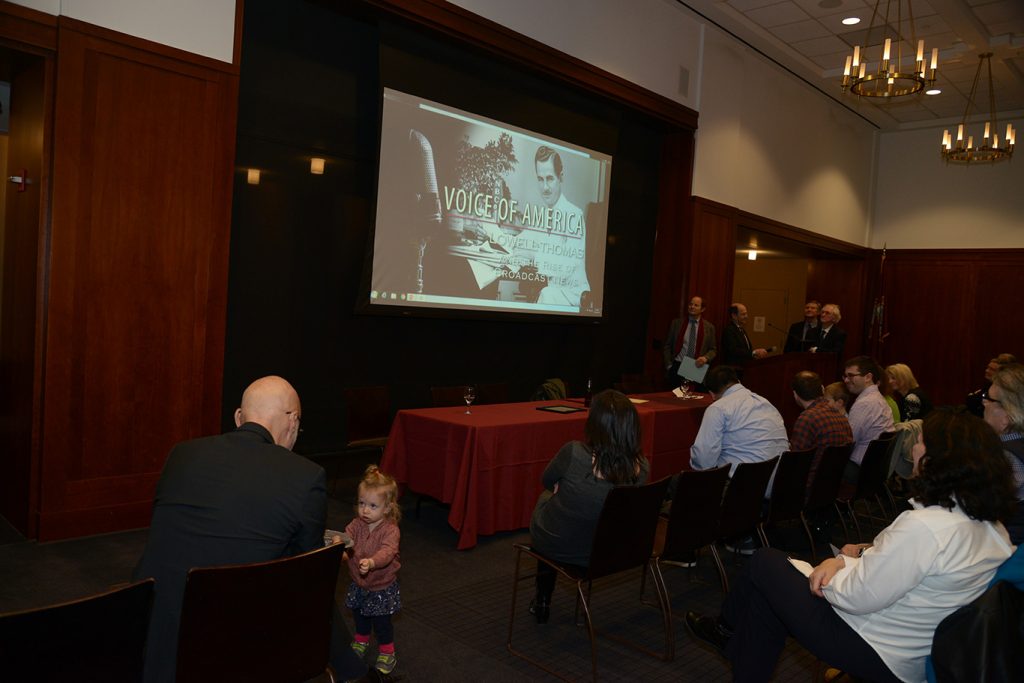

Photo by Chris Taggart
In introducing visiting poet B.H. Fairchild, Angela O’Donnell, lecturer in English and American Catholic Studies, remarked that his poems imaginatively recreate the places they describe, enabling readers “to see and hear and smell everything just as it must have been.” As a child growing up in the heartland of America in the 1950s, Fairchild worked in his father’s metal shop, an experience which made him practiced in two things: the fine, detailed skill of working with the lathe; and the cool, discerning eye that comes from working with strangers.
The award-winning author of The Art Of The Lathe (Alice James Books, 1998) gave a reading on April 11 at the Rose Hill campus, offering vibrant, nostalgic poems that recall his childhood and youth in Texas and Kansas; and, more precisely, his father’s machine shop near Highway 54, the main north-south road to Route 66.
“A lot of hitchhikers would come there and stop, wanting one or two weeks work, just enough to get some food and money,” he recalled, “My father would hire them.”
In “The Grey Man,” Fairchild wrote of cutting weeds with such a stranger: a man with “eyes set in concrete” who has “a dead, leathern pall upon his skin so vile it makes you pull away.” In another poem, “Beauty,” Fairchild described an incident in the machine shop where two men strip naked in front of everyone; silently, suddenly, and shockingly.
“I was a boy; I didn’t even have the word ‘exhibitionism’ in my vocabulary,” he recalled. “But I know what happened was important. That entire day, none of the other men in the shop spoke to each other.”
Fairchild also recited two poems around the bored, thrill-seeking youth of the desolate towns he grew up in. In “What He Said,” he described a young man so obsessed with Brigitte Bardot that he proclaims “I would walk on my tongue from here to Amarillo just to wash her dishes.’ To Fairchild’s literary ear, the uncharacteristic expression of feeling constituted “a rise into poetry by pure accident.” In another poem, “Rave On,” the author recalls spending a Saturday night with three friends who tempt death by car-rolling.
O’Donnell, herself a poet, said the decision to invite Fairchild to Fordham had an unusual genesis. She received an e-mail from a professor entitled, “The Best Baseball Poem I’ve Ever Read.” The e-mail had circulated among other faculty members, and, O’Donnell said, people started demanding to meet the author (Fairchild). O’Donnell spearheaded the effort and received support from the Curran Center for American Catholic Studies, the Bronx African American History Project, the American Studies Program and Fordham College at Rose Hill — “four groups that don’t often intersect,” she said — to bring the poet to campus.
That baseball poem, “Body and Soul,” describes a young teen who joins a sandlot baseball game with men just past their prime, and who turns out to be “a blue-eyed bringer of truth” to men who suddenly realize their youth is spent. (The teen, it turns out, is named Mickey Mantle.)
Currently the Larraine Sherley Professor of American Literature at Texas Christian University, Fairchild has been writing poetry for 30 years. The Art of the Lathe was the National Book Award finalist in 1998. Fairchild said that the hardest thing about being a poet is “finding the time to write poems.”
“I write whenever I can open up a slice of the day — which is responsible for my having become an insomniac,” he said. “Over the decades the only time I could write was after everybody else went to bed. I must say it is also a very seductive time to write, except that it puts you out of sync the next day.”
“But unless you are James Merrill (heir to Merrill Lynch), you have to work for a living,” he said.
– Janet Sassi
]]>The Sperber award is given annually for a biography or autobiography of a journalist or other media figure. The award was established with a gift from Liselotte Sperber, in memory of her daughter Ann M. Sperber, who wrote the biography of Edward R. Murrow, Murrow: His Life and Times (Fordham University Press, 1998). The book was nominated for a Pulitzer prize.
Navasky’s autobiography covers his life and career at The Nation, where he was editor from 1978 until 1995, publisher and editorial director 1995 to 2005, and is currently publisher emeritus. His book was chosen by a six-member committee of experts in the field of media and communications. Albert Auster, Ph.D., associate professor and associate chair of the Department of Communication and Media Studies, called Navasky’s book “a superb autobiography, and a welcome addition to the literature of how progressive political discourse is carried on in the United States.”
– Janet Sassi
]]>